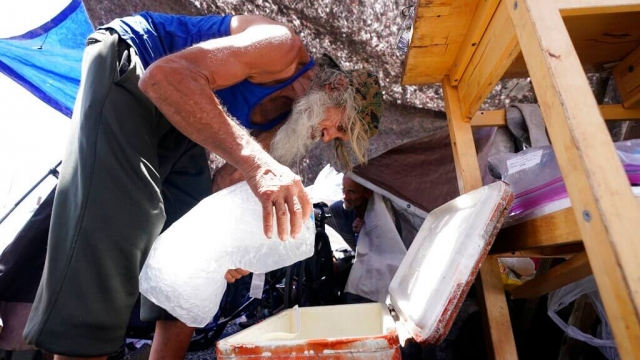The heat blanketing Arizona and much of the rest of the Southwest isn't expected to let up any time soon — experts expect this week Arizona will set a new record for consecutive days above 110 degrees Fahrenheit.
In 1974, a historic heat wave brought 18 consecutive days of 110 degrees or higher, setting the state record.
Sunday, July 16th marked the 17th consecutive day Phoenix reached 110 degrees or more — and triple-digit temperatures are expected to continue for the rest of the week.
Human Services Campus CEO Amy Schwabenlender says the extreme heat puts people living on the streets at a greater risk for heat-related complications as many are pushed further out by the city, which is working to clear the largest city encampment in an area downtown called "The Zone."
The city is facing two lawsuits over their move to clean up the streets covered in tents and makeshift homes.
Schwabenlender says their weekly intake, which documents the number of homeless people living up to a mile out from their campus, which includes "The Zone," shows that the city has made little to no progress on decreasing the homeless population.
"Since the city has intensified efforts we haven’t seen the total number change dramatically," Schwabenlender said.
SEE MORE: Sidewalk, contact burns a real concern with extreme heat
Human Services Campus has enough space to house 900 people, and Schwabenlender said they are at capacity. She adds that there are not enough shelters or affordable housing to protect the homeless population from the extreme heat.
The latest intake on June 3 found 780 people living in "The Zone," down from 911 the week prior. Schwabenlender said the number of people living on the streets tends to drop off temporarily at the beginning of the month because people receive vouchers or checks that can be used for housing.
"When people are living in a nylon or a tarp temporary structure all the time on pavement, asphalt … the effects of that heat are just increased dramatically," said Schwabenlender.
In 2022, 425 people died of heat-associated deaths in Maricopa County, a 25% increase from 2021, according to the latest report by the Maricopa Department of Public Health.
Earlier in July, an unofficial analysis determined the planet's temperature reached a record high.
"It's worth noting that the day we set the world temperature record was also the day we set the record for the most flights in the air that there have ever been," environmentalist, author and scholar Bill McKibben said. "Those planes themselves are not causing climate change. They are only 3% or 4% of the problem, but they're indicative of why things have gotten out of control."
The hottest temperature recorded in Phoenix was 122 degrees Fahrenheit in 1990. In 1994, Lake Havasu set a heat record for the state at 128 degrees.
SEE MORE: Heavy rains flood Northeast; scorching heat grips South, Southwest
Trending stories at Scrippsnews.com





